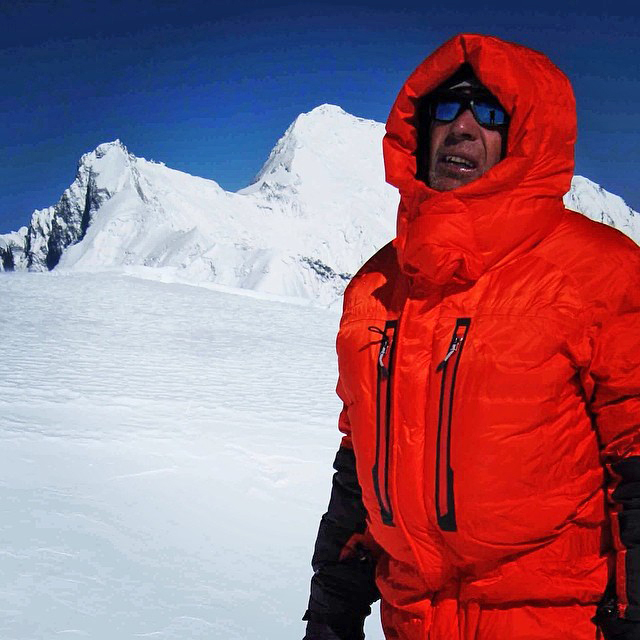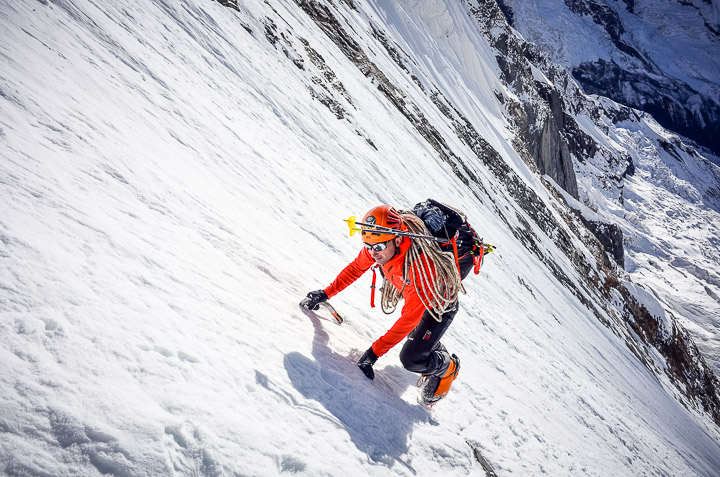Adventurer leaves poles to explore roof of world

Is climbing an 8,000m Himalayan peak a holiday? Possibly, if your usual job is more gruelling, like circumnavigating the Arctic Circle solo or walking, sailing and kayaking around the equator. swissinfo.ch meets Mike Horn on Mount Makalu.
For the past couple of weeks, the 47-year-old has called the advanced base camp of the 8,463- metre-high peak home. This is where the Swiss-South African adventurer is acclimatising and preparing for a summit ascent, together with Swiss mountain guide, Frederic Roux.
Before the climb, he told swissinfo.ch why he’s taken up mountaineering and his plans for his next extreme adventure.
swissinfo.ch: Mountains are not really your forte. How come you are aiming for the summit of Makalu?
Mike Horn: I am not really a climber but I have summited three 8,000m-peaks, namely Gasherbrum I and II and Broad Peak in Pakistan. Last year I attempted K2 but had to turn back. I am [new to the mountains], but I love the surroundings and the life above 8,000 metres without supplemental oxygen.
The 47-year-old adventurer was born in South Africa and resides in the Alps of western Switzerland. He is considered one of the world’s most daring sportsmen, being named over the years as the Best Alternative Sportsman of the Year or Adventurer of the Year.
1997: navigates entire length of Amazon River in about six months, using only a hydrospeed or riverboard.
1999: spends four months circumnavigating the globe following the equator, walking, cycling, sailing, canoeing.
2002-2004: starts a journey lasting more than two years to circumnavigate the Arctic Circle by boat, kayak, ski kite and on foot.
2006: part of two-man team to become first to travel unaided from Russia’s Cape Artichesky to North Pole in permanent darkness of winter. Duration: 60 days.
2008-2012:
Pangaea project
–
works with select groups of youth to teach exploration and raise environmental awareness during trans-navigation of the globe by sea and land
swissinfo.ch: In a previous conversation we’ve had you said that climbing these mountains was easy compared to your other challenges. How can climbing an 8,000m peak without support possibly be easy?
M.H.: Climbing an 8,000m-peak is easy compared to what I have done in the past. But what is not easy about climbing such a big mountain is doing it without supplemental oxygen. That’s what makes climbing interesting. In the mountains you can turn around at any moment and you are usually fine. When you go to the Poles or are in the middle of the jungle, you can’t turn back. The will to win becomes bigger than the fear of losing. I understand the dangers of the lack of oxygen and of crevasses. I am not saying that climbing these mountains is easy, but being able to make that call to turn back is easier than what I have done before.
swissinfo.ch: You normally go completely solo, which is not the case on Makalu. How do you cope with being dependent?
M.H.: I don’t think I am much more dependent. I don’t ask any questions. I simply look at how Fred climbs and where he puts his feet. That’s how I learn. I don’t like learning by the book. I don’t know it all and that’s why I am here – I want to learn more. If you don’t know it all, there is room to learn, and that’s what is interesting about life. I think life stops when you know it all.
swissinfo.ch: Why did you choose Makalu as your first 8,000m-peak in Nepal? Why not Mount Everest, which everybody knows?
M.H.: Mount Everest is a trademark – it’s bigger than Mike Horn. If I said to the press that I was going to climb Everest, it would be bigger than what I do. It is such an amazing icon to everybody in the world – whether you know anything about mountaineering or not. But I can’t put myself on the summit with more than 500 people in one single day. It would decrease the value of all my other achievements. It is not a bigger challenge than going to the North Pole at night or swimming the Amazon. Look at the beauty of Makalu. There are far fewer people here and it’s completely different. When I chose the mountains, which I would like to climb in my life, I looked at the beauty and challenges and Makalu has everything that fulfils my needs.
swissinfo.ch: What is your main goal on this mountain? Is it the journey, the summit or maybe even paragliding from the top?
M.H: My greatest challenge is to come back alive. Turning back ten metres from the summit will not be a disappointment for me. The moment when I had to abandon my first North Pole expedition five days away from my destination was the moment I learnt the most. I love exploration and if you are passionate about exploration, the summit is never the goal.
swissinfo.ch: But climbing Makalu is not really an exploration, is it?
M.H.: I am actually here to find myself. This is my holiday and I love just being here, acclimatising, carrying our equipment, feeling the ice and the wind. The summit is nothing to me. It means a lot to the sponsors, however, I’m almost 50 years old and my life as an explorer has almost come to an end.
swissinfo.ch: You have achieved amazing things in your life – things other people only dream about. Have achievements become smaller to you?
M.H.: For true exploration there is no step back; there is only a step forward. If you start looking back, you no longer have a goal. If you start moving back through exploration, it means you have reached the end of your life as an explorer. I follow the famous saying: “If your dreams don’t scare you, they are not big enough.” I wake up here in my tent and I am afraid of my dreams. It is not climbing Makalu – that is already done in my head. It is more what I am planning in the future. Once your dreams no longer scare you, you are moving backwards.
swissinfo.ch: Other than your dreams, are you ever scared of your undertakings?
M.H.: I get scared quite often and being afraid gives me the chance to survive. If I am not afraid, I am going to stop doing what I do. If we are not scared of what we do, we will make stupid mistakes. I see the huge ice blocks above my head here and I’m afraid because I know what happens if they fall. It is fear that forces us to turn back, however, that fear comes with knowledge and that knowledge can only be acquired when you push your limits.
swissinfo.ch: You mentioned that you may be at the end of your life as an adventurer. I can’t quite believe that. Any more plans?
M.H.: I will be quite busy for the next two years. After Makalu I will start the circumnavigation of the world via the two Poles, which I would like to do in 360 days as it stands for 360 degrees. Afterwards I will start building a massive boat to take any person of any age to live something they haven’t lived. You don’t have to go all the way to the Himalaya to find adventure. You can find it at your doorstep. Doing something new in life is an adventure. I don’t see myself as a mountaineer, a sailor, a polar explorer or a jungle guru. I just see myself as a normal guy, who collects information in order to benefit from all the natural elements that are given to us as human beings.
swissinfo.ch: How do you cope with always being away from home?
M.H.: In the past five years, I have spent 30 days at home in Lausanne. Home is something you carry in your heart. A lion in a cage is no longer a lion. It is the same with my wife and kids. They understand that Mike Horn is someone out there exploring, and they support me. In return I give them something unique that no other man in the world could give them – and that bonds a family. I have been with my family for over 25 years and my kids are healthy, well-educated, proud and independent. They do not benefit from Mike Horn as an image. They are aware of the fact that I need them more than they need me. And this is how success grows. Success is not me boasting with what I have achieved; it is by saying who helped me to do what I love doing. And that’s why it works.

In compliance with the JTI standards
More: SWI swissinfo.ch certified by the Journalism Trust Initiative











You can find an overview of ongoing debates with our journalists here . Please join us!
If you want to start a conversation about a topic raised in this article or want to report factual errors, email us at english@swissinfo.ch.